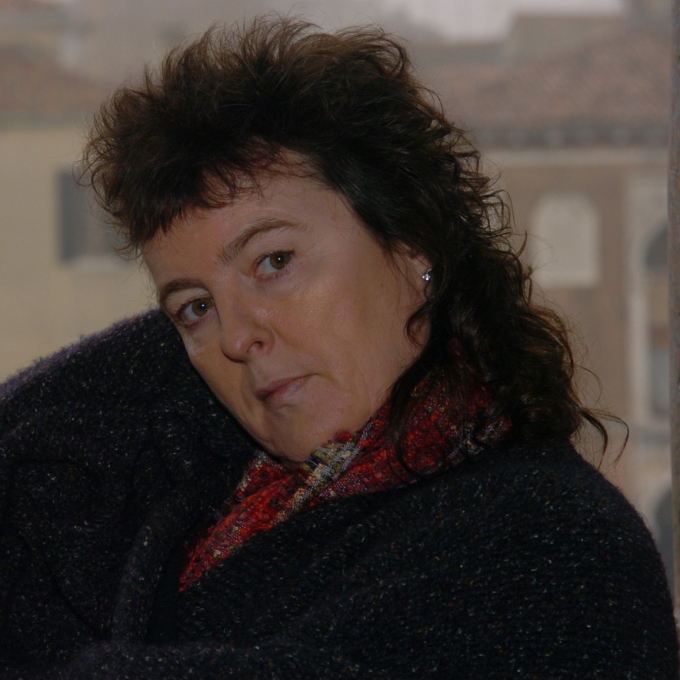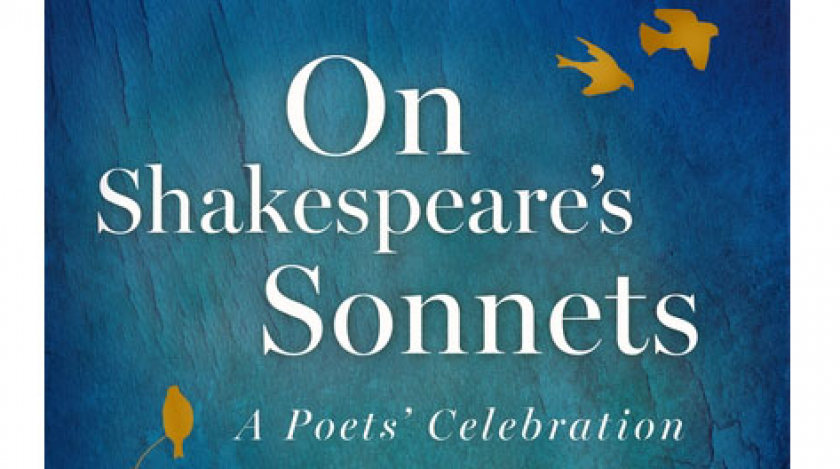
- ©
- Michael Woods
Biography
Poet, playwright and freelance writer Carol Ann Duffy was born on 23 December 1955 in Glasgow and read philosophy at Liverpool University.
She is a former editor of the poetry magazine Ambit and is a regular reviewer and broadcaster. She moved from London to Manchester in 1996 and began to lecture in poetry at Manchester Metropolitan University. Her papers were acquired by the Robert W. Woodruff Library of Emory University in 1999, and in October 2000 she was awarded a grant of £75,000 over a five-year period by the National Endowment for Science, Technology and the Arts.
Her adult poetry collections are Standing Female Nude (1985), winner of a Scottish Arts Council Award; Selling Manhattan (1987), which won a Somerset Maugham Award; The Other Country (1990); Mean Time (1993), which won the Whitbread Poetry Award and the Forward Poetry Prize (Best Poetry Collection of the Year); The World's Wife (1999); Feminine Gospels (2002), a celebration of the female condition; Rapture (2005), winner of the 2005 T. S. Eliot Prize; The Bees (2011), winner of the 2011 Costa Poetry Award and shortlisted for the 2011 T. S. Eliot Prize; The Christmas Truce (2011), Wenceslas: A Christmas Poem (2012), illustrated by Stuart Kolakovic; Dorothy Wordsworth's Christmas Birthday (2014) and Sincerity (2018). Her children's poems are collected in New & Collected Poems for Children (2009). In 2012, to mark the Diamond Jubilee, she compiled Jubilee Lines, 60 poems from 60 poets each covering one year of the Queen's reign. In the same year, she was awarded the PEN/Pinter Prize.
She also writes picture books for children, and these include Underwater Farmyard (2002); Doris the Giant (2004); Moon Zoo (2005); The Tear Thief (2007); and The Princess's Blankets (2009).
Anthologies edited by Carol Ann Duffy include Out of Fashion (2004), in which she creates a vital dialogue between classic and contemporary poets over the two arts of poetry and fashion; Answering Back (2007); and To The Moon: An Anthology of Lunar Poems (2009).
Carol Ann Duffy is also an acclaimed playwright, and has had plays performed at the Liverpool Playhouse and the Almeida Theatre in London. Her plays include Take My Husband (1982), Cavern of Dreams (1984), Little Women, Big Boys (1986) and Loss (1986), a radio play. She received an Eric Gregory Award in 1984 and a Cholmondeley Award in 1992 from the Society of Authors, the Dylan Thomas Award from the Poetry Society in 1989 and a Lannan Literary Award from the Lannan Foundation (USA) in 1995. She was awarded an OBE in 1995, a CBE in 2001 and became a Fellow of the Royal Society of Literature in 1999.
Carol Ann Duffy lives in Manchester and is Creative Director of the Writing School at Manchester Metropolitan University. She was Poet Laureate from 2009 until 2019, succeeding Andrew Motion.
Critical perspective
Carol Ann Duffy, one of the most significant names in contemporary British poetry, has achieved that rare feat of both critical and commercial success. Her work is read and enjoyed equally by critics, academics and lay readers, and it features regularly on both university syllabuses and school syllabuses. Some critics have accused Duffy of being too populist, but on the whole her work is highly acclaimed for being both literary and accessible, and she is regarded as one of Britain’s most well-loved and successful contemporary poets.
Duffy’s themes include language and the representation of reality; the construction of the self; gender issues; contemporary culture; and many different forms of alienation, oppression and social inequality. She writes in everyday, conversational language, making her poems appear deceptively simple. With this demotic style she creates contemporary versions of traditional poetic forms - she makes frequent use of the dramatic monologue in her exploration of different voices and different identities, and she also uses the sonnet form. Duffy is both serious and humorous, often writing in a mischievous, playful style - in particular, she plays with words as she explores the way in which meaning and reality are constructed through language. In this, her work has been linked to postmodernism and poststructuralism, but this is a thematic influence rather than a stylistic one: consequently, there is an interesting contrast between the postmodern content and the conservative forms.
Deryn Rees-Jones’ brief but useful study, Carol Ann Duffy (Northcote House, Writers and Their Work Series, 1999), lists the many diverse influences on Duffy’s work. Her use of demotic, everyday language can be traced back to Wordsworth, while her interest in the dramatic monologue links her to Browning and Eliot. Her work also shows the influence of Philip Larkin (nostalgia and dry humour), Dylan Thomas (elements of surrealism), the Beat poets and the Liverpool poets.
Though Duffy’s status and reputation rest predominantly on her poetry, she has also written various plays, and there is a lot of overlap between her poetic and dramatic skills. When her first major poetry collections, Standing Female Nude (1985) and Selling Manhattan (1987), were published, Duffy was immediately acclaimed for her outstanding skill in characterisation, timing and dialogue, particularly in her use of the dramatic monologue. She is acutely sensitive and empathetic as she places herself into the mindset of each character and articulates the respective points of view in the idiom of the characters’ own speech. Duffy often incorporates humour with serious insights and social commentary, as in ‘Standing Female Nude’ (from the collection of the same name):
Six hours like this for a few francs.
Belly nipple arse in the window light […]
I shall be represented analytically and hung
in great museums. The bourgeoisie will coo
at such an image of a river-whore. They call it Art.
Other poems, such as ‘Shooting Stars’ (also from Standing Female Nude) are acutely poignant and disturbing, and jolt the reader with their sharp dramatic timing. ‘Shooting Stars’ articulates the voice of a dying woman in a Nazi concentration camp:
[…] One saw I was alive. Loosened
his belt. My bowels opened in a ragged gape of fear.
Duffy’s more disturbing poems also include those such as ‘Education for Leisure’ (Standing Female Nude) and ‘Psychopath’ (Selling Manhattan) which are written in the voices of society’s dropouts, outsiders and villains. She gives us insight into such disturbed minds, and into the society that has let them down, without in any way condoning their wrongdoings: ‘Today I am going to kill something. Anything. / I have had enough of being ignored […]’ (‘Education for Leisure’).
In The Other Country (1990) and Mean Time (1993) Duffy began to explore memory and nostalgia, resulting in comparisons with Philip Larkin. These collections contain fewer dramatic monologues and more personal poems than her previous collections, but she continues to address political, social and philosophical issues. One of the most poignant of the personal poems is ‘Valentine’ (Mean Time). Duffy often writes about love, with heartfelt feeling but never with sentimentality, and she explores its complex nature, its pain as well as its bliss. The personal is also combined with the philosophical - ‘Valentine’ is one of many poems in which Duffy investigates the way in which meaning is constructed through language, as the speaker tries to move beyond clichés and find a more authentic way of expressing feeling and experience:
Not a red rose or a satin heart.
I give you an onion.
It is a moon wrapped in brown paper.
It promises light
like the careful undressing of love.
[…] I am trying to be truthful.
The World’s Wife (1999) returns to the dramatic monologue with an innovative collection of poems that articulate the voices of the (imagined) wives of various historical figures, both real and fictional (titles include ‘Mrs Aesop’ and ‘Mrs Darwin’). Throughout her career, Duffy has been applauded for addressing gender issues without being one-sided or overtly political - Deryn Rees-Jones notes that she moves beyond ‘a straightforwardly feminist poetry’ and shows ‘the difficulties that patriarchy presents to both men and women’ (Rees-Jones, ref. above, p. 3).
Nonetheless, Feminine Gospels (2002), as the title suggests, is a concentration on the female point of view. It is a celebration of female experience, and it has a strong sense of magic and fairytale discourse. However, as in traditional fairytales, there is sometimes a sense of darkness as well as joy. Birth, death and the cycles and stages of life feature strongly, including menstruation, motherhood and aging. Duffy’s beloved daughter Ella was born in 1995, and her experience of motherhood has deeply influenced her poetry (as well as inspiring her to write other works for children). Poems such as 'The Cord' and 'The Light Gatherer' rejoice in new life, while ‘Death and the Moon’ mourns those who have passed on: ‘[…] I cannot say where you are. Unreachable / by prayer, even if poems are prayers. Unseeable / in the air, even if souls are stars […]’.
The next collection, Rapture, is intensely personal, emotional and elegiac, and markedly different from Duffy’s other works. The poems of Rapture, one of Duffy's most highly acclaimed works, chart a love story (thought to be based on Duffy’s relationship with Jackie Kay, which ended in 2004), from the first heady stage of falling in love (‘Falling in love / is glamorous hell’) to the end of the relationship:
[…] What do I have
to help me, without spell or prayer,
endure this hour, endless, heartless, anonymous,
the death of love? […]
(Extract from ‘Over’)
This is Duffy at her most serious - the poems are rich, beautiful and heart-rending in their exploration of the deepest recesses of human emotion, both joy and pain. These works are also her most formal - following in the tradition of Shakespeare and John Donne, Duffy’s contemporary love poems in this collection draw on the traditional sonnet and ballad forms.
In 2010, Duffy published Love Poems, a selection of poems from her earlier collections, including Rapture, as well as four poems from The Bees, a new collection which was published in its entirety in 2011. While Rapture and Love Poems concentrate exclusively on love poems, The Bees is a diverse collection demonstrating Duffy's wide range and versatility, as Liz Lochhead comments: 'Here's a mixter maxter of every kind of Duffy poem: angry, political, elegiac […] witty, nakedly honest, accessible, mysterious' (review in the Guardian, 4 November 2011). Particularly poignant are the poems about Duffy's mother, who died in 2005:
But nothing so cold as the February night I opened the door
in the Chapel of Rest where my mother lay, neither young, nor old,
where my lips, returning her kiss to her brow, knew the meaning of cold.
('Cold')
Duffy became Britain's first female Poet Laureate in 2009, a position which requires her to produce celebratory poems to commemorate national events, particularly royal occasions. In 2012, the year of the Queen's Diamond Jubilee, Duffy compiled Jubilee Lines: 60 Poets for 60 Years, in which sixty poets have written a poem each, one for each year of the Queen's reign. The final poem, 'The Thames, London 2012', is Duffy's own: 'A Queen sails now into the sun, / flotilla a thousand proud […].' Duffy's acceptance of the laureateship and willingness to produce this type of poetry has come as a surprise, given that she has always held strong left-wing views and, when she was passed over for the role ten years earlier, she expressed her distaste for it ('I will not write a poem for Edward and Sophie. No self-respecting poet should have to'). However, upon accepting the laureateship in 2009, Duffy claimed that her only concern was what her teenage daughter thought about it, while others have acclaimed the way in which her appointment has brought fresh blood into a traditional male role:
After 350 years of male dominance, the new royal poet is a Glaswegian lesbian […] Ten years ago she was passed over, but now her time has come.
(William Langley, Telegraph, 2 May 2009)
Elizabeth O’Reilly 2013
